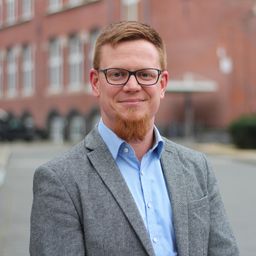
Daniel Kipp is currently employed as a teaching staff member and research associate at the THGA university and is mainly responsible for modules such as "special steels and their applications", "fatique and lifetime of machine elements" and "Practice Course: The Example Zollverein". As a PhD student at the TU Dortmund, he is working closely with the hcc.ruhr on research questions regarding non-destructive testing methods for time-efficient and data-based evaluation of transparent coating systems.
Before joining TH Georg Agricola university, Daniel Kipp had several positions in the industry such as technical marketing specialist at Deutsche Edelstahlwerke and Swiss Steel International in USA and in the quality assurance department at VDM Metals. Daniel Kipp studied "Applied Materials Science" at THGA university and in his Master's degree he expanded his know-how in Metallurgy and Metal Forming at university Duisburg Essen.
Sessions auxquelles Daniel Kipp participe
Lundi 29 Août, 2022
Within the scope of a research project, state of the art sensor-carrying drones using optical, thermal and multispectral imaging are used for the inventory of object of industrial heritage. Within the a first study the applicability of the sensors on corroded/coated surfaces and complex geometries (crevices) shall be elaborated. For this purpose, tests will be carried out on exhibits and samples under defined laboratory conditions and initial results will be compared. The further approach,...
Sessions auxquelles Daniel Kipp assiste
Lundi 29 Août, 2022
This session is about the “hard facts” of conservation. It aims to draw together technical knowledge from related fields. Industrial conservation specialists rely on specialised knowledge and may sometimes not be aware that there is expertise and proven good or best practice in related fields. The transferring of knowledge from related engineering, construction preservation and architectural conservation specialists can serve the purpose of promoting and securing future preservation of ...
This session is about the “hard facts” of conservation. It aims to draw together technical knowledge from related fields. Industrial conservation specialists rely on specialised knowledge and may sometimes not be aware that there is expertise and proven good or best practice in related fields. The transferring of knowledge from related engineering, construction preservation and architectural conservation specialists can serve the purpose of promoting and securing future preservation of ...
This session is about the “hard facts” of conservation. It aims to draw together technical knowledge from related fields. Industrial conservation specialists rely on specialised knowledge and may sometimes not be aware that there is expertise and proven good or best practice in related fields. The transferring of knowledge from related engineering, construction preservation and architectural conservation specialists can serve the purpose of promoting and securing future preservation of ...
Dans une ambiance traditionnelle du temps des sucres québécois, profitez d’une tire d’érable roulée sur neige dans la plus pure tradition, accompagnée d’une musique de circonstance !
Mardi 30 Août, 2022
Industrialization processes have been global from their very beginning. However, their interpretation still tends to be limited to specific locations or regions, and to specific time periods. Regularly, for example, it is stated that the industrial revolution started in Europe, from where it spread to the world, supposedly bringing technological and social progress to „less developed“ countries. Earlier periods of technology and knowledge transfer processes, that were already in place in t...
During the Industrial Revolution coal was the most important energy source for both homes and industries. At the time, coal mining created strong regional industrial identities and mentalities, as well as industrial images and imaginaries in the eyes and minds of external observers. Such identities and ideas of coal would go on to shape industrial landscapes and communities.The papers presented in this session investigate the s...
During the Industrial Revolution coal was the most important energy source for both homes and industries. At the time, coal mining created strong regional industrial identities and mentalities, as well as industrial images and imaginaries in the eyes and minds of external observers. Such identities and ideas of coal would go on to shape industrial landscapes and communities.The papers presented in this session investigate the s...
Past efforts to conserve and interpret industrial heritage have rarely acknowledged the role of industry causing damaging environmental change. But todays obvious worldwide climate change inevitably impacts our thinking about conservation. This is why we propose a Roundtable session to encourage people to take a fresh look at environmental impacts of industrial heritage.Already in the 1970s narratives of industrial history as a succession of triumphs began to be qu...
Vendredi 2 Septembre, 2022
Les participants se retrouveront à l'entrée (il n'y en a qu'une) du métro Lionel Groulx et de là, ils longeront le canal jusqu'aux écluses de St-Gabriel. Cette zone était autrefois la plus industrialisée du Canada. C'est aujourd'hui une zone d'affluence entre le quartier difficile, mais en voie d'embourgeoisement, de Pointe-Saint-Charles, historiquement irlandais et français, et la Petite-Bourgogne, l'un des premiers quartiers multiraciaux de Montréal. Plusieurs anciennes usines ont été co...
Venez échanger sur les bons moments du congrès et célébrer vos découvertes scientifiques et professionnelles dans une ancienne fabrique de confiture de fruits, l’Usine C, construite en 1913 et transformée à la fin des années 1970 en lieu de création et de diffusion.Découvrez la gastronomie montréalaise grâce à un traiteur d’exception. Apprenez des bribes du patrimoine musical montréalais et de l’histoire du quartier industriel qui lui a prêté vie. Puis entendez et vivez la tradition...
